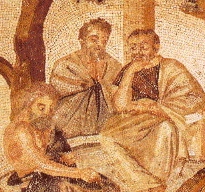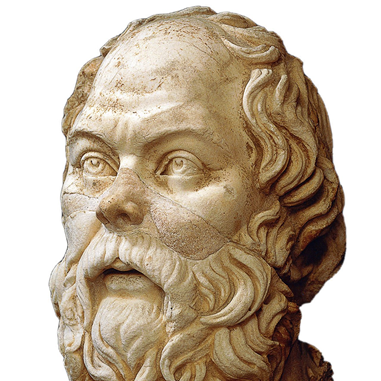Introduction
There is no figure in the history of philosophy more famous than Socrates. To pronounce his name means to evoke in the human soul one of the best historical memories. Even in ancient times, in people’s minds, he became the embodiment of sapience and the ideal of a sage who put truth above life.
‘Socrates in Love’ Review: A Vigorous, Brilliant Young Man. (James, 2019).
A vast amount of literature has accumulated about Socrates, his personality, and his doctrine. And, nevertheless, in the history of philosophy, there is no person more mysterious than Socrates. The fact is that Socrates did not leave a written inheritance. People learn about his life and teachings mainly from the writings of his students and friends, including the philosopher Plato, and the historian Xenophon, or his ideological opponents, for example, the comedian Aristophanes, as well as from the books of later authors, including Aristotle. However, the attitude towards Socrates at different times was ambiguous, often diametrically opposite. Some of his contemporaries saw in him a dangerous atheist and sentenced him to death. Others considered the accusation of godlessness groundless and considered Socrates a deeply religious person. In subsequent times, up to the present day, Socrates was also evaluated and appreciated in different ways. For some, he is a great philosopher; for others, a boring moralist. Nevertheless, the fact remains undeniable that Socrates significantly influenced both his modernity and the future development of society, demonstrating his unsurpassed oratory, proposing his method of refuting statements, and making his splendid contribution to the development of philosophy and the transformation of social values.
Mastery of public speaking

Socrates himself did not leave a single line, but Plato was precisely that student of his who, with his deep and penetrating spirit, was most capable of conveying the essence of Socrates. There is a mosaic depicting Socrates with his disciples, including Plato.
The Relationship Between Socrates and Plato. (n.d.)
Prior (2019) notes that Plato has a beautiful image depicting the influence of people on each other, according to which the soul, meeting with another soul, kindred to it and high, receives wings and the ability to spiritual flight. This ability to inspire other people’s souls is highly characteristic of Socrates. Even now, when many centuries later people read about Socrates and hear the sound of his invigorating speeches in the classical transmission of Plato, they feel that they are captured and lifted by the spirit of good genius. The reader learns about the influence he had on his contemporaries from the testimony of Plato. According to Wolfsdorf (2017), not one of the Athenian orators acted so strongly and deeply on listeners, men, women, and young men – as Socrates with his simple speeches: tears flowed, beat heart, a soul was embarrassed and indignant against its slavery.
Thus, the living force of knowledge and goodness was embodied in Socrates. When what people are so longing for and so looking for – peace of mind and confidence in the meaning of life – is displayed in a specific person, in a living image, this convinces better than any systems and theories. This is why his listeners are going to Socrates, and everyone wants to listen to this amazing man who, in an era of general skepticism and disintegration, walks with such a cheerful air, a comforting speech, and a genuinely philosophical view of things.
Socrates method
Moreover, Socrates is best known for the method of conducting a conversation, which was named after him – the Socrates method. Taylor (2019) affirms that this method was first described in Plato’s work and consists of refuting statements. Socrates’ approach to the questioning method is based on a consistent, thoughtful dialogue. Socrates, asked sequential thoughtful questions, which stimulated learners to logically verify their thoughts and assess their reliability. Within the framework of this method, he portrayed a complete ignorance of the topic to provoke a dialogue with the apprentices. The Socratic method is widely used to this day, especially in the law schools of American universities. First, teachers invite students to summarize the position of the judge. They then ask if the student agrees with this position, and then the professor asks a lot of questions to get the student to defend his opinion. Due to the Socratic method, students learn critical thinking, logical construction of their arguments, as well as the ability to find and obviate weaknesses in their position.
Changing values in society
Socrates’s philosophical works and ideas established the foundation for Western philosophy and reoriented social values from material to spiritual. Schultz (2019) states that Socrates is often associated with saying: “The unexamined life is not worth living.” Socrates was persuaded that to become profound, persons should understand themselves. He supposed that people should be engaged in self-development, rather than focusing on material values. Therefore, Socrates’ unique approach to cognition, conscience, ethics, and morality became a critical momentin ancient philosophy and changed the value orientation of society.
Conclusion
Thus, although Socrates himself did not leave the slightest information about himself and the basic knowledge about him is known thanks to his environment, the image of this philosopher is associated with great wisdom. This personality not only had an incredible impact on his contemporaries, but also influenced the future. First, Socrates was a master of public speaking, and his speeches inspired many people to change and take action. Secondly, Socrates proposed his method of argumentation, which is currently actively used in jurisprudence. Thirdly, this philosopher drew attention to spiritual values instead of material ones and turned the value orientations of society. Therefore, the influence of Socrates on both his present and the future is significant.
References
James, J. (2019). ‘Socrates in Love’ Review: A Vigorous, Brilliant Young Man. [Online image]. The Wall Street Journal. Web.
Prior, W. (2019). Socrates. Wiley.
Schultz, A.-M. (2019) Socrates as public philosopher: A model of informed democratic engagement. The European Legacy, 24(7-8), 710-723. Web.
Taylor, C. (2019). Socrates: A very short introduction.Oxford University Press.
The Relationship Between Socrates and Plato. (n.d.) [Online image]. Famous Trials. Web.
Wolfsdorf, D.C. (2017). The historical Socrates, in: C. Bobonich (ed.), The Cambridge companion to Ancient ethics. Cambridge.